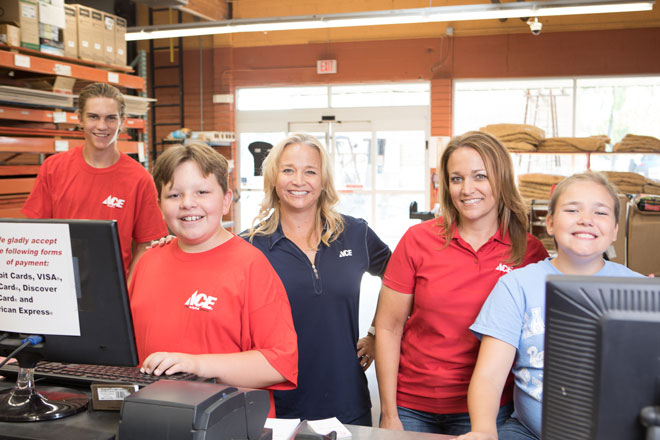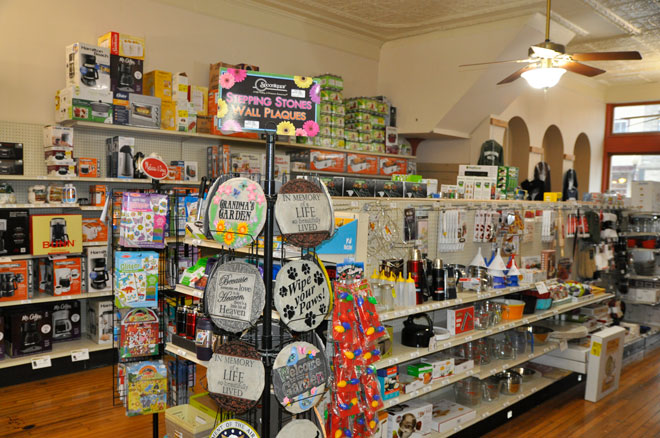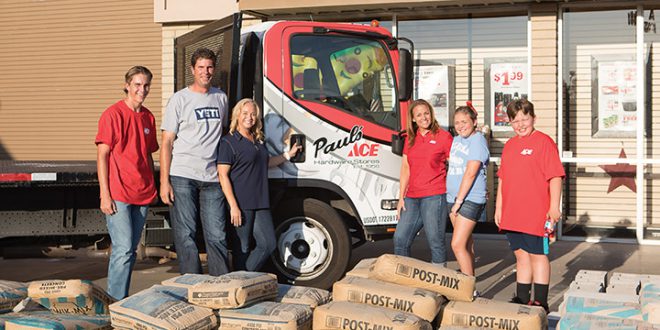Click the image above to view a PDF of the story.
Home improvement retailing is a business where there’s a lot of longevity. It’s not unusual to see a business in its second or third generation, with some dating back even further.
More than likely, when a business shifts from one generation to the next, it doesn’t happen overnight or without forethought. It’s a process that starts long before the outgoing family member’s last day. The incoming generation is successful when it’s properly prepared for the responsibilities of ownership.
Each generation offers new perspectives and new ideas, and they all inevitably initiate changes that will allow them to put their mark on the business. Everyone needs to be aware of what the other has to offer, to treat each other with respect and trust, and be aware of their own limitations.
Hardware Retailing spoke with two retailers who have either been through the transition from one generation to the next or are currently going through it. Sisters Julie Buchkowski and Tricia Dauwalder-Luna are third- generation retailers who bought Paul’s Ace Hardware, an operation with eight locations in Arizona, about 10 years ago. For Barry Hill, the transition is still a few years away as he currently works alongside his father as co-owner of Hills Hardware Hank in Wabasha, Minnesota. Their stories can help you navigate the potential pitfalls and opportunities that come with a transition of leadership.
Paul’s Ace Hardware
About a decade ago, sisters Julie Buchkowski and Tricia Dauwalder-Luna bought Paul’s Ace Hardware from their father, Don. They are third-generation owners of the business which was established by their grandfather, Paul, in 1956.
Today, Paul’s Ace is an eight-store chain in the area surrounding Scottsdale, Arizona. The sisters have been responsible for adding three of those locations and have continued to build on the successes of their family.
For them, a transition in leadership didn’t slow down the forward momentum of the business. Rather, they have been able to build on the successes of the past. That’s been possible because their family has a commitment to communication and willingness to embrace change.
Find What’s Missing
Buchkowski and Dauwalder-Luna say it’s difficult to pinpoint a day when they started preparing for what is now their careers. It was an ongoing process that started when they were very young. “Working in a hardware store was just something we grew up doing,” says Buchkowski. “You learn a lot just by being there and watching others.”
When the sisters started to get serious about future ownership, they began to identify aspects of the business where they needed more training. Buchkowski says she needed to know more about finances so she started taking classes at a community college. That experience was so valuable, she ended up recommending it to several other employees.
Although the importance of a strong grasp on finances may seem obvious, not all retailers leading a company understand the basics of accounting. Buchkowski believes it’s critical not to minimize the necessity of that skill. “You need to know how you make your money and that everything you do affects your profitability,” she says.
That learning process doesn’t stop, either. Even after they became owners, the sisters say they still look for opportunities to learn, whether it’s through product training vendors provide, seminars at their co-op’s buying markets or by networking with other retailers.
And there’s usually a takeaway they can use to make the operation better. “I feel like I’m always learning,” says Buchkowski. “We both make an effort to get together with other retailers when we can. I always enjoy hearing how another store does a certain process or procedure.”

Change With the Times
Retailers passing a business on to their children should realize there are many skills they can teach, but it’s impossible to prepare for every situation, especially in a changing retail landscape. The best mindset is to not be afraid to adjust to the realities around you, even if that means making changes to the comfortable habits of the past.
Today, one of those realities is online competition. Customers are more apt to price shop, which has altered the way Buchkowski and Dauwalder-Luna think about their stores’ prices. Before, they had always been fairly confident in their pricing strategy. Now, shoppers increasingly scrutinize their prices.
Another big change comes from an expanded store count, which has necessitated a shift in management styles. While past generations have taken a more hands-on approach, Buchkowski and Dauwalder-Luna are learning to step back and let their store managers take more control.
In fact, their overall approach to their staff is more open than it was with their parents or grandparents. “We are a lot more open to sharing information with our employees than our dad may have been,” says Dauwalder-Luna. “We want everyone to know what’s going on in the company.”
Employees who understand how and why the business operates the way it does are more likely to support changes and contribute to growth. “It’s not effective to just tell your employees, ‘This is how we’re going to do it because I said so.’ It’s better to communicate why you’re doing what you’re doing,” says Buchkowski.
Open communication from the top down promotes ownership and collaboration among rank-and-file employees, a way of management that is perhaps more common in business today than it was in previous generations.
Keep Listening
Don Dauwalder has retired, but like many small business owners, it’s been difficult for him to step away completely. He still has plenty of ideas for the business. He still shows up at one of the stores eager to put that plan into action. Sometimes those plans line up with what his daughters want for the business; sometimes they need convincing. Usually it takes some time to talk it through, a delay that can be frustrating to someone eager to move forward.
For some families, that could be a recipe for tension, making the transition of leadership more difficult. Fortunately, for the Dauwalders, there’s a good relationship between father and daughters. They want their dad to enjoy his retirement, but also give him opportunities to contribute to the business when he wants to. The key to making it work is mutual respect on all sides.
“It’s important for the younger generation to appreciate the knowledge the older generation has, to find their strengths and limits, and then find a good balance,” says Dauwalder-Luna. “It takes patience on both sides. It’s important that we both understand that we’re like-minded and understand what’s happening. We treat each other with respect.”
A careful approach to change is a philosophy that has benefited the sisters beyond family relationships. Some of the stores they’ve purchased have been from retailers retiring. Instead of immediately dropping their own ideas into a well-established business, they tap into the retiring owner’s wealth of knowledge. Why have they run the business the way they have? What has worked in the past, what hasn’t, and why?
Before they can be effective in changing what has been done before, say the sisters, it’s important they understand and appreciate the way things were done. There’s much to learn from the previous generation and their ideas can help shape the business going forward.
Hills Hardware Hank
Father-son duo George and Barry Hill have been working together as co-owners of Hills Hardware Hank in Wabasha, Minnesota, for a couple of years now.
George bought the business in 1998 when his children were in high school. While Barry worked in the store on and off through college, he never thought of it as part of his career path. He pursued a degree in political science and public administration, then tried a handful of different jobs, but nothing seemed to be the right fit.
Then, a management position opened up in the hardware store. Barry decided to give it a try. After a couple of years, he bought half of the business from his mother and became a co-owner. Since then, Barry has initiated an expansion to the business with the purchase of the building adjoining their store. He also introduced new categories and implemented a new POS system to help run the business.
Eventually Barry plans to buy the other half of the business as George eases into retirement. They’ve already been talking with the bank so they’re ready for the financial portion of the transition. When it comes to operating the business, they’ve also been taking a methodical approach that will help avoid some of the potential pitfalls of two generations working side by side.
Divide Responsibilities
When Barry decided he wanted to buy into the business, with the intention of someday purchasing his father’s remaining share, he realized he had a lot to learn. He may have been familiar with the day-to-day operations, but now he needed to take a big-picture look at the business. He also had a lot of ideas for how to make the business better. The best way for him to do both, they decided, was to divide up his responsibilities.
“We’ve given ourselves clearly defined duties,” says Barry. “My dad controls the purse and the administrative part of the business. I run the store. As he gets closer to retirement, we’ll start moving more things off his plate and onto mine.”
They communicate with each other regularly so they know what is going on in all parts of the operation. But having distinct responsibilities has made them a good team. It also helps Barry understand what he still needs to learn and gives him more freedom to implement changes.
For example, it didn’t take long for Barry to realize that updating the store’s technology would go a long way to increase efficiency. He installed a POS system that would help with ordering and store processes, such as managing returns. His father fully supported the move, but when it comes to actually using the system, he’s just as happy to let the younger generation do the work.

Cut Ties Gradually
Dividing responsibilities between himself and his son will ease the transition when George decides to exit the business completely. Like any retailer who has given a lot of blood, sweat and tears to their business, it could be tempting to want absolute control until the very end. “For anyone who has always had tight rein on their business, letting go can be tough. It’s become part of your life,” he says. “I think it’s easiest to deal with that by letting go in small doses instead of all at once.”
Instead of dictating every move, he lets Barry run with his own ideas. “Barry is a go-getter and I don’t want to slow him down,” George says. “If I were always dictating to him how to do something, this transition would be tough.”
Putting all of the responsibilities of running a business on Barry all at once would be a recipe for burnout. George is also hoping the business will not consume as much of Barry’s life as it did his own 20 years ago. He wants to see Barry be able to spend more time with his children. Fortunately, by automating many of the store’s processes, Barry is working smarter, not harder, which helps his time management as he takes on more responsibilities.
Find Mentors to Help You
For Barry, thinking about full store ownership has changed a lot about the way he views the business. He appreciates the take-it-slow approach and has looked to his father to teach him much of what he needs to know. But he’s also found it has been valuable to find mentors outside of the business, too.
When Barry saw the opportunity to purchase the building adjoining the store last year, he got an exercise in creating a business plan, and then heading to the bank to secure financing. Not only did he get a loan, but he also established
a valuable relationship with his local banker, who taught him some important lessons in finances. Through the process, Barry found invaluable resources at his local small business development center and his wholesaler.
“I remember being at a meeting of local business owners and asking, ‘What is the No. 1 thing I need for my business to succeed?’ The person told me it was a mentor,” says Barry. “To anyone looking to business ownership, I think it’s critical to find those people you can call anytime you need advice.”
Realistic Expectations
George is proud to have his son work alongside him, but when he got into the business 20 years ago, that wasn’t his expectation. “Like most retailers, I bought this business for myself, for my future,” he says. “I didn’t expect my children to be a part of it. I never wanted to lay that burden of expectation on them, as that could have prompted resentment.”
Not every child wants to run their parent’s business, or they just don’t have the personality or skills to do it. Rather than projecting your own dreams for what you want them to be, says George, it’s important to honestly ask, “Will this really be a good fit for my kid?”
George doesn’t want the pressures of business or his own expectations to damage his relationship with his children. When he exits the business, George plans to cut all financial ties so the success, or failure, of his store will not affect his own retirement “I don’t want to be in a position where I need anything from the store and won’t be a burden to them or foster any resentment,” he says.
George, of course, is proud of Barry’s decision. “I could have just slapped a price tag on the store and walked away when I was done,” George says. “Exiting gradually might take more work, but it gives me a huge satisfaction that my kids and maybe even grandkids will be a part of this.”
 Hardware Retailing The Industry's Source for Insights and Information
Hardware Retailing The Industry's Source for Insights and Information









